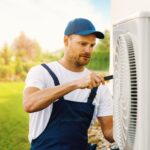
Signs Your HVAC System Needs Repairs Before It’s Too Late
Your HVAC system plays a crucial role in keeping your home comfortable year-round, but like any mechanical system, it requires
If your furnace has stopped working, it can be a cause for concern. Not only is the lack of warmth and comfort an issue, but you may also be worried about the cost of repairs or replacements. Fortunately, there are several things you can do to troubleshoot the problem before calling in an expert. In this blog post, we’ll cover some key tips on what to do when your furnace stops working.
If you’re having trouble with your furnace, one of the easiest solutions could be to check the power source. If it isn’t plugged in or if the circuit breaker has been tripped, then this could explain why your furnace isn’t heating up. A tripped circuit breaker can occur due to an over usage of electricity and can easily be reset by a switch located in your breaker box or fuse box. Take the time to properly inspect your power source before calling a professional as malfunctions in this area are rather quick and easy to fix!
If your furnace isn’t working, it’s a sure sign that something is off. Before reaching out to a professional, the first step should be to check the thermostat settings. Ensure that the temperature setting is correct and check to make sure the furnace switch is in the “on” position. Additionally, verify that there are no objects blocking any vents. If these steps don’t fix the issue, then there may be more substantial malfunctioning within the system and professional help should be sought.
Is your furnace refusing to turn on and keep your home warm? Before you call a technician, take a quick look at the filter! Clogged filters are often the culprit when a furnace isn’t working properly. Inspecting the filter is one of the most important preventive measures that you can take, as a dirty filter will restrict airflow and reduce efficiency. A clogged filter can also cause serious damage to your system if not addressed promptly. By replacing or cleaning your filter when it becomes dirty you will ensure your system runs efficiently, maximizing the life span of your furnace.
If your furnace isn’t working, it’s time to take a closer look. It’s important to check for signs of damage that might be impacting the performance of your furnace – things like dents, rust, or other physical issues. If you spot any of these problems, it could mean significant damage to the unit and require an expert in HVAC repair to solve the issue. Taking care to identify any outside elements that might be damaging your furnace will ensure more efficient energy use and better long-term results. Be smart and inspect your furnace thoroughly before turning on the heat this winter.
Before trying other methods to repair your furnace, take a look at the vents leading into and out of your home, check to see if any of them are blocked or obstructed in any way. This can be as simple as dust accumulation or foreign objects that shouldn’t be there. Give the vents around your house a good inspection and unclog anything you can find. You may find that this was the only issue preventing your furnace from functioning properly!
If you’ve tried all the troubleshooting tips for your furnace, but still haven’t been able to get it working at optimal capacity, don’t hesitate to contact a professional. A heating and cooling expert will be able to detect any faulty wiring or broken components that weren’t traceable with the tips you found online. They can also ensure your furnace is properly fitted in accordance with the manufacturer’s specifications for maximum efficiency during bad winter months. Calling a professional may cost more up front, but it will certainly save you from costly repairs or replacements down the line.
When your furnace isn’t working, it’s important to take the time to troubleshoot and inspect for any possible damage. From checking your thermostat settings to inspecting outdoor vents and filters, there are many simple steps you can take before having to call in a professional. However, if all else fails or you notice substantial signs of damage that could be impacting performance, don’t hesitate to contact an HVAC expert. They will have the expertise necessary to identify any underlying issues with your system and ensure optimal functionality.

Your HVAC system plays a crucial role in keeping your home comfortable year-round, but like any mechanical system, it requires
5 Tips for Winterizing Your Home This Season Your home’s HVAC system works hard to maintain your home’s temperature year-round,
Do you notice that cold air still escapes from your vents even after you’ve turned on your heating system? This


© 2025 Total Home Solutions, LLC